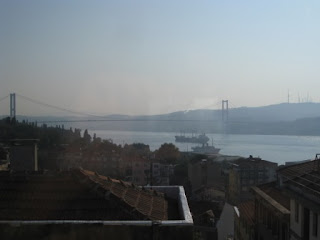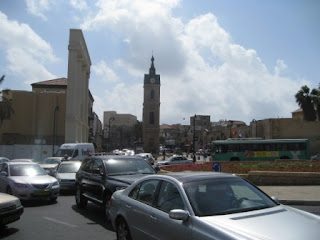I'm also lousy at souvenir shopping. I just never seem to find things that speak to me. So if I don't bring cool stuff back to my friends back home, it isn't because I'm not thinking about you--it's because nothing is good enough for you.
Meanwhile, I have been walking around Istanbul for a few days, and have in fact seen some cool things, most of which are quite well-known attractions.
I arrived just in time for Erev Rosh Hashanah. Mostafa, one of two people I know in Istanbul, was kind enough to contact a Jewish friend, who was kind enough to arrange for us to attend services at his synagogue, one of quite a few in Istanbul.

Istanbulu Jews are mostly descendents of Jews expelled from Spain during the Inquisition, so they're Sephardi. Over the intervening 500 or so years, they've become quite integrated into Turkish society. The service was interesting--the same words I'm used to but even more mumbled than at typical Ashkenazi services. And at one point, when I was lost in the service, I started hearing Spanish! Well, it was actually Ladino, which I knew was still spoken by some here, but it still took me by surprise.
The other notable aspect of the Rosh Hashanah in Istanbul was the security. There have been a few bombings of synagogues here, so they're pretty uptight about whom they let in. Because we were not members, we had to go to the side entrance and fill out a form, show our passports. All was going smoothly until the guard heard Mostafa's name. And then asked for his passport, and saw that he was born in--horrors!--Lebanon. But after checking with someone, he let us in. (We didn't mention that Mostafa's parents were born in Jaffa.)
My other friend in Istanbul, Riva, has generously opened her amazing home to me while she travels down to the Aegean coast for a few days. Here are a few photos of the views from Riva's windows:





Dinner on Tuesday was in Kadikoy, across the Bosphorus, in Asia! Even though the separation between Europe and Asia is arbitrary, I'm still tickled by the fact that I look from one continent to another every day, and that we took a ferry to Asia for dinner. Here's Mostafa on the ferry to Asia:

And here's the lovely Riva with her charming and handsome boyfriend, Fehmi, after dinner (in Asia!):

I don't remember what this was, but I thought it was pretty:

Sultanahmet:

Aya Sofia:

Entrance to Istanbul University:

The view from Starbucks on the Bosphorus:

Street scenes:





For Kerri:

The view from Ortakoy (bridge to Asia in the background):

Beach on the Black Sea:












































